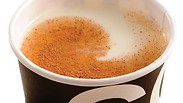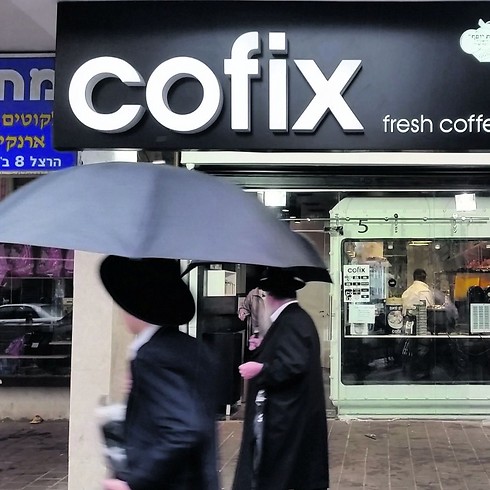
Cheap chain sparks coffee wars in Bnei Brak
After Cofix opens seven branches in ultra-Orthodox city offering all products for NIS 5, local store owners fight back with their own price reductions; battle takes on a spiritual dimension when dozens of posters warn haredi public against secular café culture. City's residents, meanwhile, couldn't be happier.
The battle took on a spiritual dimension when dozens of pashkvilim (posters) were posted on walls across the city, warning the ultra-Orthodox public against the café culture infiltrating Bnei Brak. As the business owners keep fighting each other, almost every day introduces a new deal, the latest one being a cup of coffee and a pastry for only NIS 3.
The concept behind the cheap café chain, which offers its products for a fixed reduced price, suits the ultra-Orthodox sector, and the trend has taken over the city. Stores selling their products for NIS 5 are opening one after the other, and it seems that wherever your turn your head, you will spot a cup or a paper bag bearing the chain's logo.
The current state of affairs is that seven Cofix branches have been opened in the crowded city's streets, two additional branches are being built these days, and quite a few competitors have opened cafés with a similar business model.
And the public? It couldn't be happier. The queues outside the stores and on the pavements prove that these business battles only benefit the city's residents financially.
Damage to city's Hasidic identity?
Despite the tremendous success, there are those who are unhappy with the 5-shekel trend that has taken over the city's streets. While business owners near the Cofix branches are fighting back and have been forced to reduce their prices, some of Bnei Brak's spiritual leaders have been quoted by the sector's media voicing their concern about the potential damage to the city's ultra-Orthodox identity.
According to rumors which have been spread across the city, some haredi educational institutions even forbade their students from buying the cheap chain.
The highlight of the business war is the uncompromising battle between Cofix and the Shloimale kiosk, which is located near the Itzkovitch Synagogue, a busy and vibrant area. Shloimale has been around for many years and is a well-known institution in the city. After Cofix opened an attractive store nearby, Shloimale's owner, a haredi businessman, would not give up. He decided to close a computer store he owned near the Cofix store and open a branch of the Cofizz chain, Cofix's main competitor, which also sells all its products for NIS 5. But several weeks later, he changed his mind. Instead, Shloimale announced a market-breaking deal: Delicacies and coffee for only NIS 3.
As in every war on the ultra-Orthodo street, the pashkvilim are taking center stage. "A new disease has appeared recently, seriously threatening the pure identity of the city of Torah and Hasidism," read the posters hung on bulletin boards. "A turbid wave of fast food stores is spreading across our city, with new stores emerging and opening overnight on every corner, leaving almost no area in the city without such a store."
The most serious warning, signed by the "committee for maintaining the city's identity" ended with the call: "The future of our city and our students is at stake. Don't rest and don’t sleep!"
"Anyone can write a pashkvil and hang it up," explains Yoni Biton, a yeshiva student from the city while biting into a Cofix sandwich. "Until I hear the explicit prohibition from one of the rabbis, I won't believe what it says. Yeshiva students have to think about every shekel they spend. It's annoying that kiosks that sold their products for expensive prices until now have begun offering them for cheaper prices. It makes you think about all the excess money they have taken from us all these years."
According to a recent report, Bnei Brak's Ashkenazi rabbi, Moshe Landa, refused to grant his kashrut stamp to three cheap kiosks. "This trend is suitable for Tel Aviv," one of his associates was quoted as saying. "There is no problem selling cheap food, but when it becomes a trend Rabbi Landa is unwilling to authorize it."
Cofix founder Avi Katz, a religious Jew, said in response that his chain never approached Rabbi Landau for a kashrut stamp.
In spite of the posters' firm tone, it seems not everyone is taking the warnings seriously. "There is no doubt that Bnei Brak's residents have warmly embraced the concept behind Cofix," says Itai Gadasi, a city resident and political reporter for Radio Kol Chai. "Every trend which benefits the consumer is strongly adopted here. The 'all in one dollar' stores popped up everywhere too at the time. Some 10 stores opened simultaneously. The same is happening with Cofix.
"Bnei Brak has many large families. A mother who has a child in a yeshiva knows that her son can now eat and drink for 10 shekels instead of 30. That's a wonderful thing for her. There is a kiosk which used to charge 9 shekels for a soft drink. The day a Cofix branch opened nearby, the price went down to 4 shekels. It's not that I am not angry about the old price, but it's an excellent thing for us as consumers."
Gadasi links the business battle between Cofix and the local business owners to the warnings on the damage caused to the city's identity. "In the haredi sector, if someone wants to fight something, regardless of the reason, the most efficient way is to find spiritual halachic justification for the battle. The facts are that only when the Cofix stores reached the area of the Itzkovitch Synagogue, the battle became ideological.
"The chain opened branches in the city nine months ago, but only recently people have begun hanging posters against it. I don’t think people are paying any attention to these warnings. I can also call myself a committee and issue statements. There is only one thing that can drive people away from their stores - if leading rabbis explicitly say that they are against the chain. Until then, it's all false talk."
Money talks
Those who are forced to fall in line with the Cofix prices are the veteran business owners. A kiosk owner on Rabbi Akiva Street admitted this week that he had also been forced to reduce his prices. "One has to be blind to think that this trend will not hurt our livelihood," he says, surrounded by signs offering products for NIS 5. "We have to fight for the customers."
How do you adjust to the new reality?
"You cut your expenses more, balance with other products where you can and eventually take less home. It's not this business is turning people into millionaires. So I don’t understand the public's bitterness, thinking that it has been exploited all this time. The Cofix franchisees are not making millions either. That's why I think there is no room for so many branches in the city."
Will they disappear?
"It’s not that I think they will disappear fast, but this phenomenon will cool down. Until then, we will have to make adjustments."
The owner of the Cofix store on Rabbi Akiva Street believes that the cheap coffee chain in Bnei Brak is there to stay. "I believe that Cofix has become so popular in Bnei Brak because we offer and good and cheap solution for large families. A mother of five children here pays 25 shekels for all of them. Where will she find that somewhere else? People don’t forget the old prices so fast."
Aren't the pashkvilim hurting you?
"The pashkvilim won't hurt business. At the end of the day, money talks. Bnei Brak is a crowded city. Many people pass on the street. There is great customer potential. I believe that the flames will be lowered soon and that people will see there is enough livelihood for everyone."
"In my opinion, we will eventually find the balance point between the city's special identity and the changes taking place in it," says Israel Cohen, a journalist and the commentator of haredi news website Kikar Hashabat. "We are talking about two ends - on the one hand, the secular café and overeating culture, and on the other hand, the veteran religious leadership. Yeshiva students walking on the street with pastries and a cup of coffee is something Bnei Brak wasn't used to before Cofix, so the fear of the rabbis and public activists is understandable.
"The way I see things, we are now at an interim stage in which the religious leaders are looking into the phenomenon's effect on the city's character. I believe that the damage is not that dramatic, so the solution won't be radical either."
Cohen explains that "such a battle cannot end with a loss for the rabbis, but a scenario in which all Cofix stores are closed sounds unreasonable too. The moment the balance is found, the rabbis' battle will die out. When the madness over this innovation fades away, the situation will reach a status quo. A slightly new status quo, but one which we can live with."











